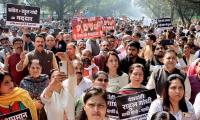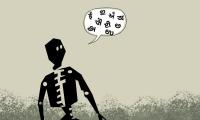Israeli Prime Minister Ariel Sharon was in 'grave' but stable condition on Thursday after undergoing a seven-hour emergency surgery to stop 'massive, widespread' bleeding in his brain, plunging the Jewish state into political uncertainty less than three months before a crucial election.
"He is stable. All his signs are within normal limits but his condition is grave," Hadassah University Hospital Director Shlomo Mor-Yosef said.
77-year-old Sharon, whose massive brain haemorrhage comes less than three weeks after he suffered a mild stroke, was transferred to the intensive care unit after the surgery.
A special session of the Israeli Cabinet was convened with Deputy Prime Minister Ehud Olmert assuming Sharon's powers.
"This is a difficult hour for all of us and a situation we're unfamiliar with," Olmert said at the start of the session.
"He is not only a leader, but a close friend of all of us. This is a difficult hour and we'll face it together," the acting prime minister said.
"We're all praying at this time for the prime minister's well-being."
Transportation Minister Meir Sheetrit said the main issue of the session is to show that the State of Israel continues to be managed as a strong democracy.
Attorney General Menachem Mazuz, Government Secretary Yisrael Maimon and Special Advisor to Sharon Dov Weisglass attended the special session. All Likud party ministers, who were set to quit the government on Sunday, were also present.
Likud leader Benjamin Netanyahu, meanwhile, announced that the decision to quit the government will be suspended until further notice. "We're in, we have a national responsibility, and this is not the time to talk about quitting," a senior Likud member said.
For Saron, dubbed 'the Bulldozer', who is seeking re-election in a pivotal nationwide poll scheduled for March 28, the second stroke came amid rising chaos in the Palestinian territories ahead of the January 25 legislative election and his precarious health could have wide-reaching implications for the Middle East peace process.
Opinion polls had earlier indicated Sharon was on course to win the March polls as the leader of new Kadima party he floated after quitting the right-wing Likud party in the face of the party rebellion over Gaza pullout.








